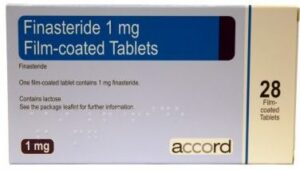Finasteride for Men

Finasteride is an oral medication that plays a crucial role in managing male pattern baldness, also known as androgenetic alopecia. Propecia is a commonly known brand of finasteride. Here are some key points about finasteride:
Mechanism of Action:
Finasteride inhibits the conversion of testosterone to dihydrotestosterone (DHT). DHT is a hormone primarily responsible for male pattern baldness. By blocking the action of the type II 5-alpha reductase enzyme (which is more concentrated around hair follicles in balding men), finasteride reduces DHT levels.
Effectiveness:
Finasteride’s effects are mainly confined to thinning areas of the scalp where hair is still present. It does not promote hair growth in completely bald areas. It effectively maintains or increases hair growth in 90% of patients.
Research shows that after five years of treatment, 90% of men using finasteride either maintained their hair density or improved it. In the same period, 48% of men treated with finasteride experienced hair growth, while 42% had no further visible progression of hair loss compared to baseline.
Finasteride is effective in treating hair loss in the front part of the scalp as well as the crown.
The peak effectiveness occurs at 2-3 years, and it continues to be effective for at least 5 years in slowing down or preventing additional hair loss. Even after 10 years, men using finasteride have more hair on average than those who didn’t use it.
Discontinuing finasteride leads to a gradual return of the hair loss pattern over 6-9 months. When finasteride is stopped, only the hair preserved by the medication is lost, returning the patient to their pre-drug balding level.
Finasteride has been in clinical use since 1992 for prostate problems and 1997 for hair loss.
Combination with Hair Transplantation:
Combining finasteride with surgery may lead to better cosmetic outcomes. Surgeons can create more density in critical areas (like the front scalp), preserving reserves for future hair loss.
Younger patients who aren’t yet candidates for hair transplant surgery can benefit from finasteride.
Usage:
Finasteride is most commonly an oral medication taken once daily, with or without meals. In some patients, less frequent use may be equally effective. More recently it has also become available as a topical solution.
Patience is key: Patients need to take finasteride for at least one year to assess its effects (growth, stabilisation, or no change).
Some patients may experience initial thinning of existing hair. This could be due to the balding process progressing before finasteride takes full effect or shedding of miniaturized hairs, allowing thicker ones to grow.
Sexual Side Effects:
Side effects at the 1-mg dose are uncommon but possible.
Approximately 3.8% of men on finasteride experienced sexual dysfunction (e.g., decreased libido, erectile dysfunction, reduced ejaculate volume) compared to 2.1% on placebo.
Most sexual side effects occur soon after starting the medication, but some may appear later.
In clinical studies, side effects reversed upon discontinuation, and even 58% of those continuing treatment saw improvement.
Anecdotal reports mention changes in penile sensation and shrinkage.
Persistent Erectile Dysfunction:
Finasteride may cause persistent erectile dysfunction (PED) in about 1% of users, with a higher risk the longer the medication is used.
Breast Tissue Effects:
Finasteride can rarely cause breast tissue enlargement (gynecomastia), and while an association with breast cancer is suggested, recent studies have not confirmed this link.
Prostate Disease:
Finasteride reduces the risk of prostate cancer diagnosis and does not increase the risk of death from high-grade prostate cancer, according to an 18-year published study. The FDA continues to assess its risk/benefit for treating male pattern hair loss.
Caution during Pregnancy:
Finasteride use is contraindicated in pregnant women and those who may become pregnant due to the risk of developmental abnormalities in the baby.
Female patients should avoid handling crushed or broken finasteride tablets during pregnancy, as absorption of finasteride could pose a potential risk to a male foetus.
Note that finasteride pills are coated, preventing direct contact with the active ingredient during normal handling, provided the tablets remain intact.
Exposure of pregnant women to semen from men using finasteride has not been shown to pose a risk to the foetus.
Finasteride Use by Men Planning to Start a Family:
No evidence currently suggests that finasteride use by men increases the risk of birth defects in their children.
Approximately 1-3% of all children worldwide are born with birth defects, a rate similar in finasteride users compared to non-users.
Some agencies advise against finasteride use in males whose partners are trying to conceive, while others state there is no reason to stop. The evidence remains inconclusive.
Remember to consult with a healthcare professional for personalised advice.
Blood Donation:
Patients taking finasteride cannot donate blood because it may potentially be given to pregnant women. Most blood clinics routinely inquire about medication use, so please refrain from donating blood if you’re using finasteride.
Effects on PSA:
Finasteride reduces serum PSA (prostate-specific antigen) levels by approximately 50% in normal men. Since PSA levels are used for prostate screening, it’s crucial to inform your physician about finasteride use.
When interpreting PSA results, remember to double the value you see on the report to obtain the true PSA value.
Patient Monitoring:
All men should inform their healthcare providers about any medications they take, including finasteride (1mg).
For males aged 50 or older (or age 40 for those with specific risk factors), routine annual evaluations for prostate issues are recommended.
These evaluations include a rectal examination, baseline PSA test, and other relevant tests based on your GP’s judgment.
Other less frequently occurring side effects
- Hypersensitivity reactions (such as lip and face swelling, itch, and rash).
- Testicular pain.
- Blood-stained ejaculate.
- Mood alterations, including depressed mood, depression, and, less frequently, suicidal ideation, have been reported in people treated with finasteride.
Prescriptions:
Our clinic can provide 6-monthly prescriptions of finasteride if our doctors recommend it for you.
For repeat prescriptions, patients are required to either attend an in-person or virtual paid consultation or fill out an online evaluation form if there are no changes to your prescription or health.
If you experience any issues or adverse reactions while taking finasteride, please contact us via email, phone or the chat facility.


